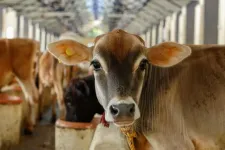(Press-News.org) UNIVERSITY PARK, Pa. — Bovine tuberculosis (TB) is a livestock disease that results in large economic losses to animal agriculture worldwide. The disease can also transmit to humans and cause severe illness and death. Researchers from Penn State, Addis Ababa University and the University of Cambridge have now demonstrated that a vaccine for TB currently used in humans significantly reduces infectiousness of vaccinated livestock, improving prospects for elimination and control. The study published today (March 28) in the journal Science.
The spillover of infection from livestock has been estimated to account for about 10% of human tuberculosis cases. While such zoonotic TB (zTB) infections are most commonly associated with gastrointestinal infections related to drinking contaminated milk, zTB can also cause chronic lung infections in humans. Lung disease caused by zTB can be indistinguishable from regular tuberculosis but is more difficult to treat due to natural antibiotic resistance in the cattle bacteria.
“For over a hundred years, programs to eliminate bovine tuberculosis have relied on intensive testing and slaughtering of infected animals,” said Vivek Kapur, professor of microbiology and infectious diseases and Huck Distinguished Chair in Global Health at Penn State and a corresponding author of the study. “This approach is unimplementable in many parts of the world for economic and social reasons, resulting in considerable animal suffering and economic losses from lost productivity, alongside an increased risk of spillover of infection to humans. By vaccinating cattle, we hope to be able to protect both cattle and humans from the consequences of this devastating disease.”
In the study, carried out in Ethiopia, the researchers examined the ability of the vaccine, Bacillus Calmette-Guérin (BCG), to directly protect cattle that receive it, as well as to indirectly protect both vaccinated and unvaccinated cattle by reducing transmission. They placed vaccinated and unvaccinated animals into enclosures with naturally infected animals in a novel crossover design performed over two years.
“Our study found that BCG vaccination reduces TB transmission in cattle by almost 90%,” said Andrew Conlan, associate professor of epidemiology at the University of Cambridge and a corresponding author of the study. “Vaccinated cows also developed significantly fewer visible signs of TB than unvaccinated ones. This suggests that the vaccine not only reduces the progression of the disease, but that if vaccinated animals become infected, they are also substantially less infectious to others.”
Next, using livestock census and movement data from Ethiopia, the team developed a transmission model to explore the potential for routine vaccination to control bovine tuberculosis.
“Results of the model suggest that vaccinating calves within the dairy sector of Ethiopia could reduce the reproduction number of the bacterium, arresting the projected increase in the burden of disease and putting herds on a pathway toward elimination of TB,” Conlan said.
The team focused their studies in Ethiopia, a country with the largest cattle herd in Africa and a rapidly growing dairy sector that has a growing burden of bovine tuberculosis and no current control program, as a representative of similarly situated transitional economies.
“Bovine tuberculosis is largely uncontrolled in low- and middle-income countries, including Ethiopia,” said Abebe Fromsa, associate professor of agriculture and veterinary medicine at Addis Ababa University in Ethiopia and the study’s co-lead author. “Therefore, vaccination of cattle has the potential to provide significant benefits in these regions.”
Professor James Wood, the Alborada Professor of Equine and Farm Animal Science from the Department of Veterinary Medicine at the University of Cambridge noted that despite being more prevalent in lower-income countries, the United Kingdom, Ireland and New Zealand also experience considerable economic pressures from the disease which continues to persist despite intensive and costly control programs.
“For over 20 years, the U.K. government has pinned hopes on cattle vaccination for bovine tuberculosis as a solution to reduce the disease and the consequent costs of the controls,” Wood said. “These results provide important support for the epidemiological benefit that cattle vaccination could have to reduce rates of transmission to and within herds.”
Other authors on the paper include Katriina Willgert, University of Cambridge; Sreenidhi Srinivasan, research associate professor, Michigan State University; Getnet Mekonnen, deputy director general, Ethiopian Animal Health Institute; Wegene Bedada, veterinary medicine professional, Ethiopian Animal Health Institute; Balako Gumi, professor, Addis Ababa University; Matios Lakew, senior livestock officer, Ethiopian Animal Health Institute; Biniam Tadesse, associate researcher, Ethiopian Animal Health Institute; Berecha Bayissa, director of vaccine production and drug formulation, Addis Ababa University; Asegedech Sirak, Ethiopian Animal Health Institute; Musse Gima, Addis Ababa University; Solomon Gebre, senior veterinary researcher, Ethiopian Animal Health Institute; Tesfaye Chibssa, director general, Ethiopian Animal Health Institute; Maroudam Veerasami, director, Cisgen Biotech Discoveries Private Limited; H. Martin Vordermeier, professor, Animal and Plant Health Agency; Douwe Bakker, technical consultant, Lelystad, The Netherlands; Stefan Berg, project manager, Bernhard Nocht Institute for Tropical Medicine; Gobena Ameni, professor, United Arab Emirates University; Nick Juleff, senior program officer, Bill & Melinda Gates Foundation; Mart C.M. de Jong, professor Wageningen University & Research; and James Wood, head of Department of Veterinary Medicine, University of Cambridge.
The Bill & Melinda Gates Foundation, as well as the Biotechnology and Biological Sciences Research Council, Department for International Development, Economic & Social Research Council, Medical Research Council, Natural Environment Research Council, Defence Science & Technology, and Biotechnology and Biological Sciences Research Council, in the United Kingdom, supported this research.
END
Vaccine protects cattle from bovine tuberculosis, may eliminate disease
2024-03-28
ELSE PRESS RELEASES FROM THIS DATE:
Andrew Siemion to receive the SETI Institute’s 2024 Drake Award
2024-03-28
March 28, 2024, Mountain View, CA -- The SETI Institute is pleased to announce that Dr. Andrew Siemion will be honored with the prestigious 2024 Drake Award for his exceptional and pioneering contributions to SETI and radio astronomy and his leadership in the field. Siemion's distinguished career includes his role as the Bernard M. Oliver Chair for SETI at the SETI Institute, Principal Investigator for the Breakthrough Listen Initiative at the University of Oxford, along with holding an Honorary Professorship ...
New study shows how the Crimean-Congo hemorrhagic fever virus enters our cells
2024-03-28
Researchers at Karolinska Institutet, in collaboration with JLP Health and others, have identified how the tick-borne Crimean-Congo haemorrhagic fever virus enters our cells. The results are published in Nature Microbiology and are an important step in the development of drugs against the deadly disease.
Crimean-Congo haemorrhagic fever virus (CCHF virus) is spread through tick bites and can cause haemorrhagic fever. The disease is serious and has a mortality rate of up to 40 per cent depending on the health status of the person infected. Common symptoms ...
Neoadjuvant chemotherapy proves effective for locally advanced penile squamous cell carcinoma
2024-03-28
In a recent multi-center study published in the Journal of the National Cancer Institute, researchers examined the effects of neoadjuvant chemotherapy (NAC) on patients suffering from locally advanced penile squamous cell carcinoma (PSCC). Dr. Kyle Rose, urologic oncologist at Ochsner MD Anderson Cancer Center, was the lead author for the publication.
The research included a cohort of 209 patients undergoing NAC, targeting locally advanced and clinically node positive PSCC. The patient group showed a diverse range of disease severity, with a distribution including 7% with stage II, 48% with stage III, and 45% with stage IV PSCC, ...
Study flips treatment paradigm in bilateral Wilms tumor, shows resistance to chemotherapy may point toward favorable outcomes
2024-03-28
(MEMPHIS, Tenn. – March 28, 2024) Resistance to chemotherapy is typically associated with poor outcomes for patients with cancer. However, St. Jude Children’s Research Hospital scientists demonstrated that in bilateral Wilms tumor (cancer in both kidneys) chemotherapy resistance can point toward a more favorable histology and an ultimatelygood outcome. The study revealed that tumors that do not respond to neoadjuvant, or tumor-shrinking, chemotherapy are predominantly ...
Doctors received approximately $12.1 billion from drug and device makers between 2013-2022
2024-03-28
HERSHEY, Pa. — Despite evidence that financial conflicts of interest may influence medical practice and research and may erode patient trust in medical professionals, these relationships remain pervasive. According to a new analysis of the Open Payments platform, a database that tracks payments between physicians and industry, a team led by a Penn State researcher found that doctors received approximately $12.1 billion from drug and device makers between 2013 and 2022.
Their findings published today (March 28) in JAMA. It’s one of the first studies to look at industry payments longitudinally and by specialty.
“Overall, ...
Discovery suggests new strategy against follicular lymphoma
2024-03-28
A team led by researchers at Weill Cornell Medicine has identified important drivers of the transformation of a type of blood cancer called follicular lymphoma from a slow-growing form to the aggressive form it takes in some patients.
The study, published March 7 in Cancer Cell, showed that while mutations affecting a gene-regulating complex called BAF can put the cancer on a dangerous trajectory, they also make follicular lymphoma highly susceptible to experimental BAF-inhibitor drugs.
“These encouraging findings could address critical and urgent challenges with this disease and have prompted us to begin planning clinical trials ...
Making the future too bright: how wishful thinking can point us in the wrong direction
2024-03-28
Everyone indulges in wishful thinking now and again. But when is that most likely to happen and when could it actually be harmful? A new study, led by the University of Amsterdam (UvA), demonstrates unequivocally that the greater the insecurity and anxiety of a situation, the more likely people are to become overly optimistic – even to the point where it can prevent us from taking essential action. The study's results have now been published in the journal American Economic Review.
‘People aren't purely truth-seekers - many beliefs are influenced by ...
Ochsner Health named to Newsweek’s America’s Greatest Workplaces 2024 for Job Starters
2024-03-28
NEW ORLEANS, La – Newsweek and Plant-A Insights Group have named Ochsner Health one of America's Greatest Workplaces for Job Starters in 2024. In a survey that included more than 75,000 young professionals and more than 540,000 company reviews, Ochsner earned 5 out of 5 stars. As the leading not-for-profit healthcare provider in the Gulf South, Ochsner is committed to championing career development among new professionals.
"We at Ochsner are honored to receive recognition as a place of employment that offers ...
Three-year study of young stars with NASA’s Hubble enters new chapter
2024-03-28
In the largest and one of the most ambitious Hubble Space Telescope programs ever executed, a team of scientists and engineers collected information on almost 500 stars over a three-year period. This effort offers new insights into the stars' formation, evolution, and impact on their surroundings.
This comprehensive survey, called ULLYSES (Ultraviolet Legacy Library of Young Stars as Essential Standards), was completed in December 2023, and provides a rich spectroscopic dataset obtained in ultraviolet light that astronomers will be mining for decades to come. Because ultraviolet light can ...
North Carolina takes the lead in PFAs research with Collaboratory’s $3 million investment to expand the state’s research capacity
2024-03-28
WILMINGTON, N.C. (March 27, 2024) – The North Carolina Collaboratory – an organization dedicated to advancing scientific research for policymaking within North Carolina – today announced its partnership with Thermo Fisher Scientific to advance the State’s per- and polyfluoroalkyl substances (PFAS) research capabilities. Supported by critical appropriations from the North Carolina General Assembly (NCGA), the Collaboratory purchased five state-of-the-art mass spectrometers that continue to position North Carolina at the forefront of academic PFAS research nationally. This new partnership ...





